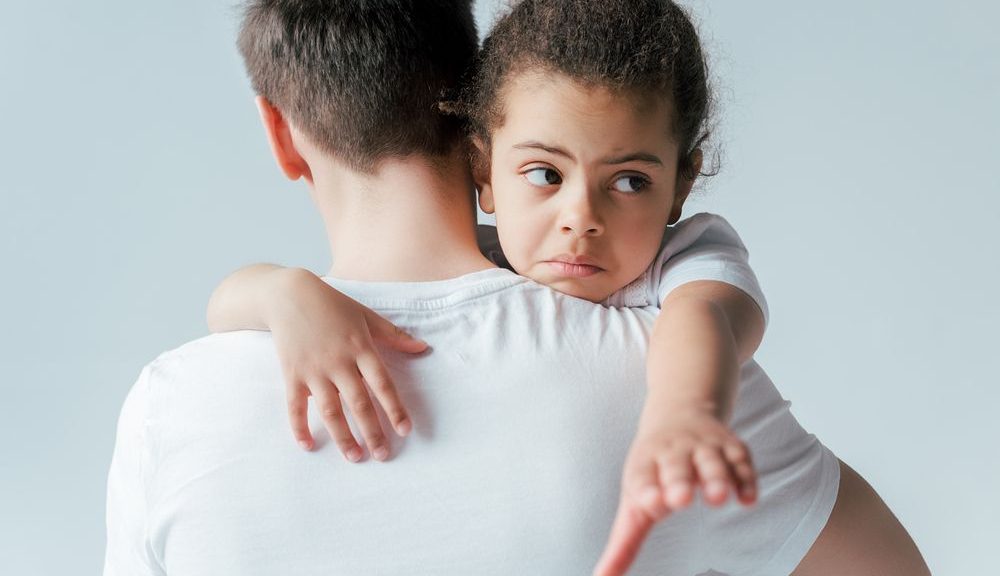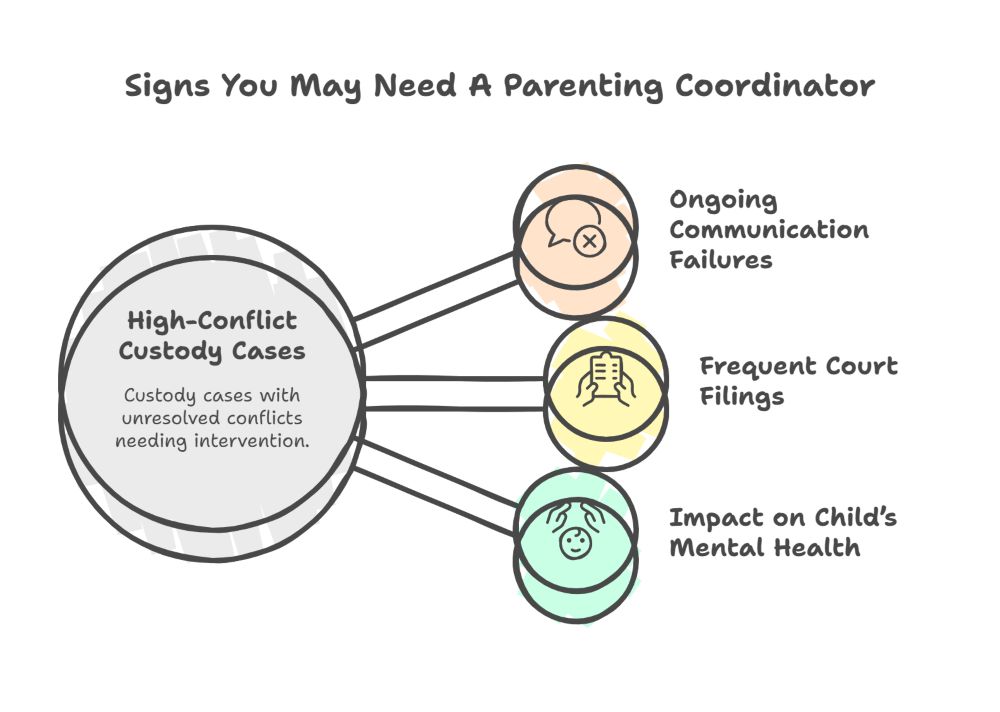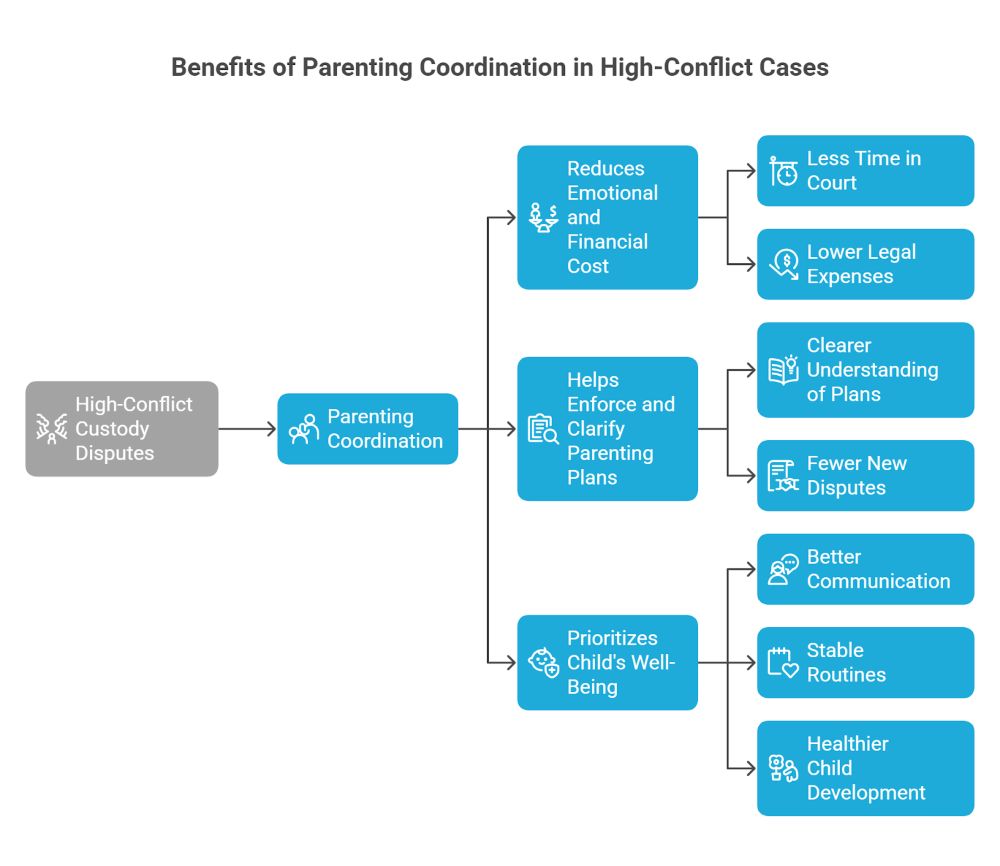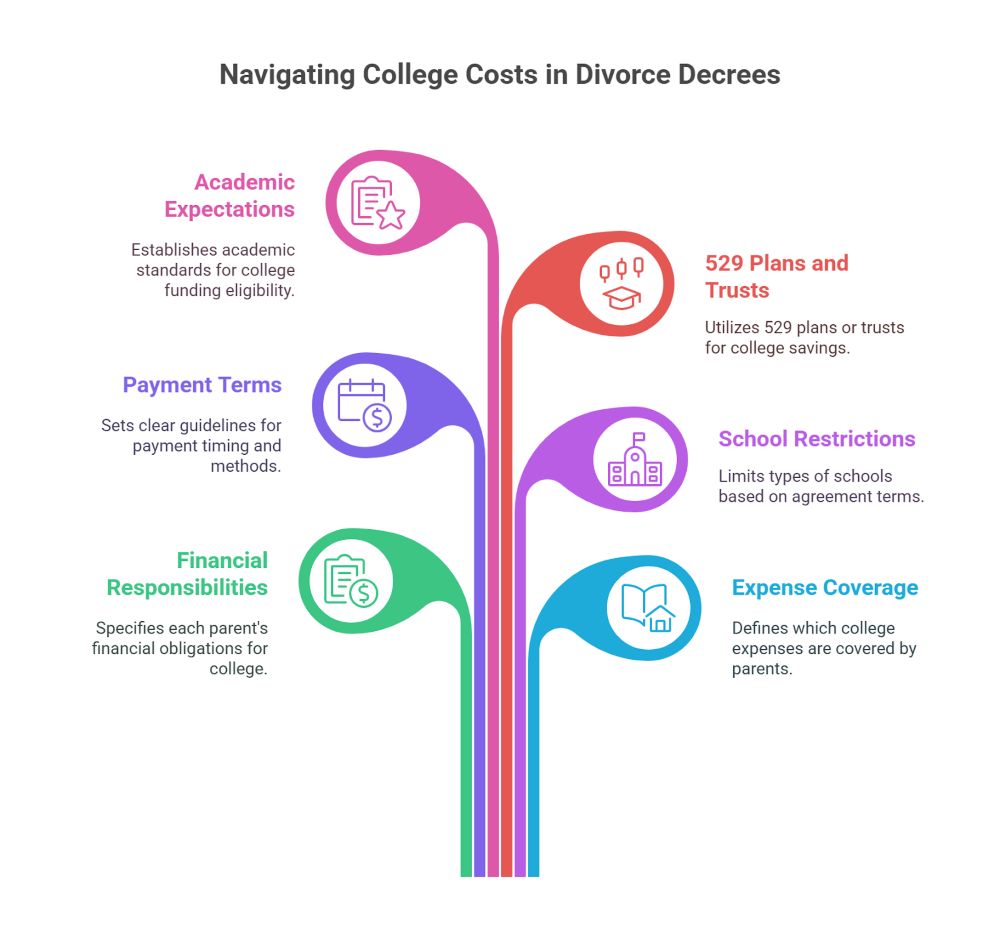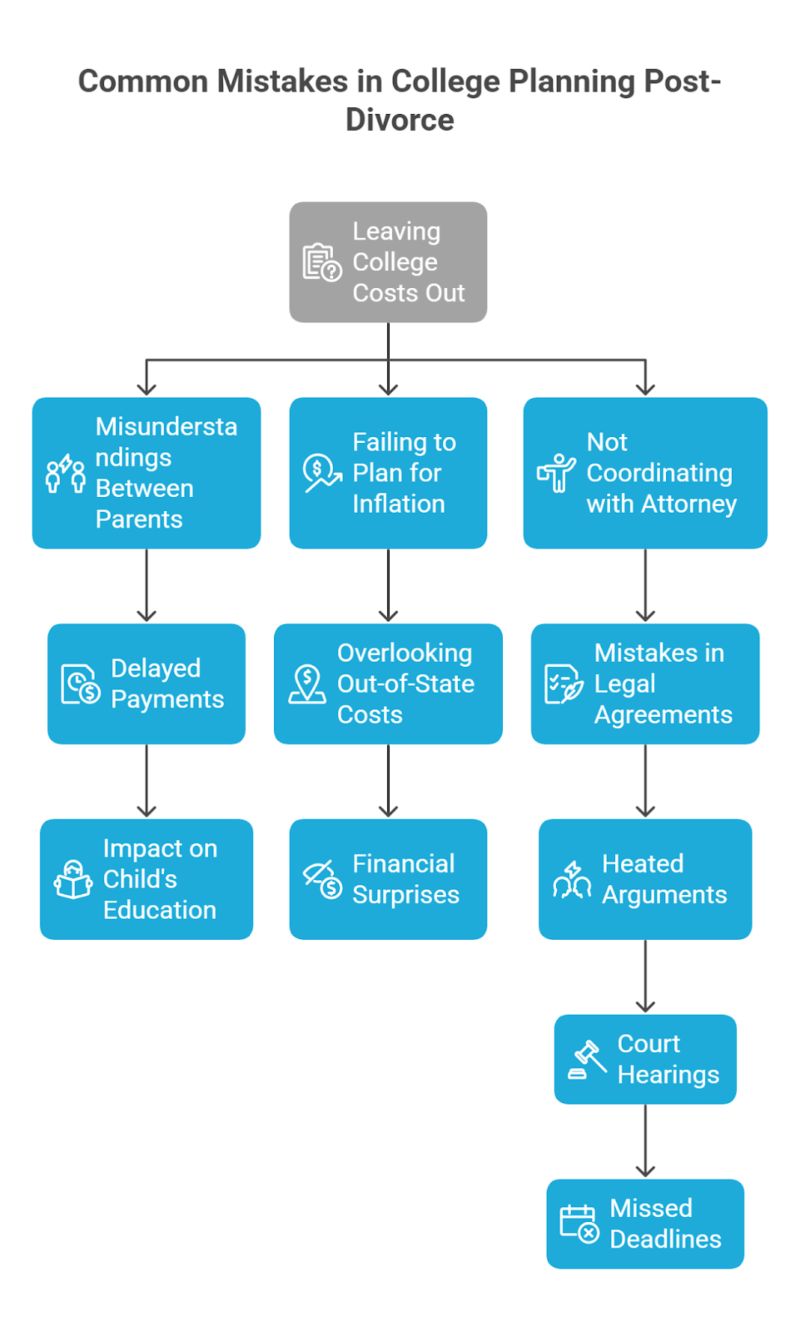Spousal struggles with substance abuse can have a major effect on child custody cases in Illinois.
Illinois courts always focus on the best interests of the child, which means that any history or evidence of substance abuse will play a significant role in parenting time and decision-making outcomes.
Parents facing these circumstances can find the custody process stressful and confusing, especially when their family’s future is uncertain.
Judges in Illinois look at whether a parent’s substance use affects the safety and well-being of the child.
Allegations of drug or alcohol problems may lead the court to order drug tests or require treatment, and can even limit or take away custody rights if the child is at risk.
Understanding what the court considers can help parents make better choices and plan their next steps during this difficult time.
Key Takeaways
- Substance abuse can strongly impact custody decisions in Illinois.
- Courts may order testing or restrictions if a parent’s substance use is proven.
- Recovery and legal assistance can significantly impact the outcome for families facing these issues.
Why Substance Abuse Matters in Illinois Custody Cases
Substance abuse can directly affect the outcome of a child custody case in Illinois.
Courts focus on how a parent’s drug or alcohol use impacts the child’s safety, well-being, and stability.
Illinois Family Law Prioritizes the Child’s Best Interests
Illinois family courts center all custody decisions on the “best interests of the child.”
This standard is found throughout all child custody drug use laws in Illinois.
When substance abuse is part of a case, judges ask whether a parent’s drug or alcohol use puts the child at risk of harm or neglect.
Judges look for patterns of behavior that may interfere with a parent’s ability to care for their child. This can include missing visits, showing up intoxicated, or failing to provide basic care.
If a parent’s substance use creates an unstable or dangerous environment, Illinois custody laws and substance abuse policies may lead to restricted parenting time or even supervised visits.
Courts also consider whether a parent is seeking treatment and making progress toward their goals. Active recovery efforts can play a positive role in how a judge views the situation.
The goal is to protect children from potential harm while encouraging parents to improve.
Common Types of Substance Abuse That Raise Legal Red Flags
Substance abuse that commonly affects child custody includes alcohol abuse, illegal drugs, misuse of prescription medications, and addiction to substances like opioids or methamphetamines.
While casual or past use may not always affect custody, ongoing addiction and related criminal behavior often do.
Specific warning signs include driving under the influence, arrests for drug offenses, or evidence of unsafe living conditions tied to drug use.
Courts may also pay close attention if the child has witnessed substance abuse or has been left unattended.
Substance use that disrupts a parent’s ability to meet the child’s needs can trigger court intervention.
Reports to the Illinois Department of Children and Family Services (DCFS) about substance abuse can also start investigations.
In many cases, DCFS may require safety plans, participation in treatment, or supervised visitation to ensure the protection of children.
Key Illinois Legal Statutes on Substance Abuse and Custody
Illinois courts use several laws and statutes to guide decisions about substance abuse and child custody.
The Illinois Marriage and Dissolution of Marriage Act outlines the process for evaluating the best interests of the child in all disputes.
Important legal factors include:
- Any history of substance abuse or dependency
- Evidence of a parent’s ability to care for the child safely
- Willingness to seek and complete treatment
If substance abuse is proven, a judge can limit parenting time, order supervised visitation, or require a parent to complete drug or alcohol treatment before regaining full custody rights.
These legal standards ensure children remain safe even if a parent struggles with addiction.
Illinois law prioritizes the child’s safety but also allows parents to demonstrate their recovery.
Facing a legal battle over custody and substance abuse? Cooper Trachtenberg Law Group can help you pursue a parenting plan that prioritizes your child’s safety. Contact us for a private case review.
If you’re ready to get started, call us now!
How Illinois Judges Evaluate Substance Abuse in Custody Decisions
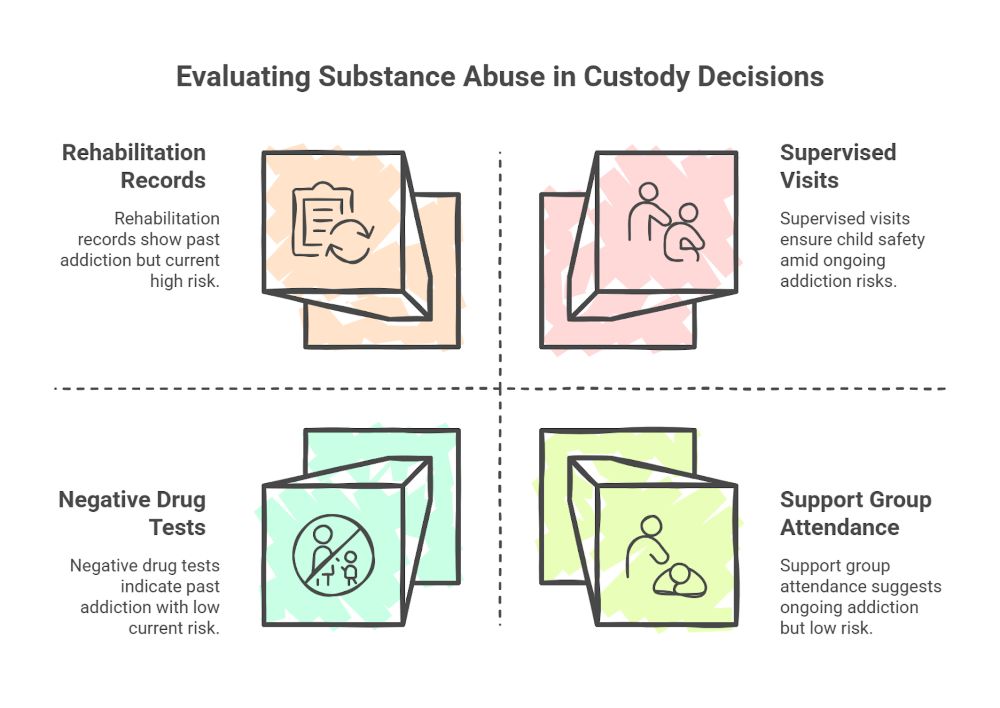
Illinois courts treat substance abuse as a serious factor when making child custody decisions.
Judges are responsible for protecting the best interests of the child by reviewing evidence, determining responsibility for the proof, and considering when the addiction occurred.
Evidence Courts Consider
Judges in Illinois family court rely heavily on evidence when evaluating substance abuse.
Typical forms of evidence include police reports, medical records, drug or alcohol test results, photographs, and witness testimony.
Courts may order drug testing if an allegation of substance use is made.
Judges can also consider evidence like counseling or rehabilitation records, criminal charges, or proof of a parent’s participation in support groups.
Sometimes, even a parent’s statements or social media posts are introduced as evidence.
In some cases, expert testimony from doctors or counselors helps the judge understand the impact of the addiction on parenting.
Ultimately, the court’s goal is to determine whether a parent’s substance use affects the child’s health, safety, or emotional well-being.
If credible complaints are made, the judge often requires proof, such as drug testing, before deciding on custody or changes to parenting time.
Judges have the power to order mandated rehabilitation or restrict parental contact with the child if substance use is found to be a danger.
Relevance of Timeframe: Ongoing vs Past Addiction
Illinois judges look at whether substance abuse is an ongoing issue or something that happened in the past.
Recent or current drug or alcohol problems weigh more heavily than events that happened years ago without recent relapse.
Courts examine how long ago the addiction took place and whether the parent has maintained sobriety.
Parents who have completed rehab and shown they can remain sober may not be considered unfit, especially if they provide evidence of ongoing recovery, like negative drug tests or attendance in support programs.
If a parent’s addiction is active or there are recent relapses, courts usually take steps to protect the child, such as supervising visits or limiting custody.
The primary concern is always whether the parents’ current situation poses a risk to the child.
Potential Custody Outcomes When Substance Abuse Is Proven
When an Illinois court finds clear evidence of substance abuse by a parent, it takes strong measures to keep the child safe.
Judges look at the facts, including the parents’ current condition, history, and efforts at recovery, before making a decision.
Full Custody Awarded to the Sober Parent
If one parent can show the other has a substance abuse problem, the court may give sole custody—both legal and physical—to the sober parent.
This usually happens when the substance use puts the child’s health or safety in danger, or if there is a history of serious incidents.
Illinois law focuses on the child’s best interests.
If parental drug use makes the home environment unsafe or unstable, the sober parent is usually favored for both decision-making and daily care responsibilities.
Documented evidence, such as failed drug tests, arrest records, or reports from child protective services, can be decisive in the court’s decision, according to guidelines discussed at Confidant Consult.
In some cases, the parent with substance issues might have no contact or may only interact with the child under specific conditions.
This protects the child from potential harm related to substance misuse.
Parenting Time Restrictions
If a parent is struggling with substance abuse but is not completely losing all custody rights, the court can order parenting time restrictions.
This can mean supervised visitation, certain times of day only, or visits only if the parent passes a drug or alcohol test.
Supervised visitation in Illinois involves a neutral third party or a professional organization watching over visits to ensure the child’s safety.
The court might also require the parent to attend counseling or enroll in a substance abuse treatment program before they receive unrestricted contact with the child.
Restriction decisions often depend on whether parental substance abuse poses a direct risk to the child.
Judges aim to balance safety with the child’s right to maintain a relationship with both parents, whenever possible.
Temporary Suspension of Custody
If substance abuse is severe or recent, a judge might order a temporary suspension of custody.
This removes legal and physical custody from the parent until they can show improvement, such as completing treatment or remaining substance-free for a specific period.
During this time, the other parent, a relative, or even the state may be given custody.
The suspended parent may lose all parenting time or be limited to supervised visits as a form of child endangerment intervention, following procedures similar to those described at Fenchel Family Law.
Reinstating custody usually requires proof of rehabilitation, clean drug tests, or recommendations from treatment professionals.
The court checks that the child will not be exposed to further risk before returning any rights to the parent.
Struggling with a co-parent’s addiction? Cooper Trachtenberg Law Group helps families navigate supervised visitation arrangements in Illinois with clarity and care. Contact us today to schedule a confidential appointment.
If you’re ready to get started, call us now!
How to Legally Respond if the Other Parent Abuses Substances
Illinois courts take claims of substance abuse very seriously when it comes to custody, visitation, and the safety of a child.
There are legal ways to protect children and make the court aware of a parent’s drug or alcohol issues.
Steps to Take Immediately
When a parent suspects the other parent of abusing drugs or alcohol, safety is the top priority.
If a child is in immediate danger, law enforcement or child protective services should be contacted immediately.
Parents can keep records, such as texts, police reports, or witness statements, that show evidence of substance use.
Documentation helps courts identify patterns and risks, rather than focusing on one-time mistakes. Talking with an attorney is vital before taking drastic steps.
Lawyers can explain the difference between guardianship and custody in Illinois, especially when substance abuse is involved.
Courts may remove or limit parenting time if it is clear that the addiction creates harm or risk to the child, such as unsafe home environments or neglect, as seen in cases involving substance abuse and child custody.
Requesting a Guardian ad Litem (GAL)
A parent can ask the court to appoint a Guardian ad Litem (GAL) if substance abuse is a concern.
The GAL is an independent lawyer trained to focus on what is in the best interest of the child.
The GAL investigates the situation, interviews the parents, the child, and other relevant individuals, and reviews appropriate records.
After the investigation, the GAL gives recommendations to the judge about custody and parenting time.
In Illinois, GALs help make sure the child’s needs come first, especially when there are claims of addiction.
Their findings carry significant weight with judges making long-term decisions about custody and guardianship.
Parents should fully cooperate with the GAL’s process, providing honest answers and all requested documents.
Filing for a Parenting Plan Modification
If substance abuse is affecting parenting time, the non-using parent can file a petition to modify the existing parenting plan or custody order.
The court will review new evidence, including proof of ongoing substance use, failed drug tests, rehab records, or police involvement.
Parents can ask for changes like supervised visits, restricted parenting time, or, in severe cases, a temporary suspension of the abusing parent’s rights to see the child.
Courts in Illinois may require proof of chronic illegal substance abuse, not just single incidents, to avoid false claims.
A lawyer can help gather the necessary evidence and paperwork.
If the parent with the substance issue enters treatment and shows clear progress, the court may later revisit custody or parenting time decisions.
Recovery, Rehab, and Rebuilding Custody Rights in Illinois
Parents in Illinois facing child custody issues due to substance abuse must show real improvements if they want to restore their rights.
Judges look for lasting change, sincere effort in recovery, and the ability to provide a safe home for the child.
Demonstrating Sobriety to the Court
Illinois courts closely examine a parent’s commitment to sobriety when considering changes to custody.
Judges may order frequent and random drug or alcohol tests.
Proof of completing a certified rehab program or attending support groups such as AA or NA is important.
Parents should keep detailed records of their treatment efforts and progress.
Clean drug tests, therapy attendance, and positive feedback from counselors help show progress.
Letters from therapists, sponsors, or other support people can also make a difference.
Failure to meet sobriety standards can lead to continued restrictions on contact or even the loss of custody rights.
Family Reunification Plans
Family reunification plans are court-approved strategies that help parents reconnect with their children after substance abuse issues.
These plans often begin with supervised visits while the parent is in recovery.
Gradual increases in time together may follow as long as the parent meets all requirements set by the court.
The primary objectives of reunification plans are to ensure the child’s safety and facilitate a lasting recovery.
Parents may need to complete rehabilitation, attend parenting classes, or participate in therapy with their child.
The court makes adjustments to the plan based on regular progress updates.
Courts aim to proceed slowly and carefully, ensuring that the child’s best interests are always protected.
How Long Does It Take to Regain Custody?
Regaining custody after substance abuse in Illinois is not a quick or guaranteed process.
The timeline depends on the parents’ progress, the nature of their addiction, and their ability to follow the court’s requirements.
Some parents may regain custody within a few months if they demonstrate steady improvement, show no relapses, and provide a safe environment.
Others may wait years, especially with ongoing struggles or repeated relapses.
Timelines can include:
- Completion of outpatient or inpatient rehab
- Consistent negative drug tests over months
- Therapy and compliance with all reunification steps
Each case is unique. Judges focus on the child’s needs and long-term safety before restoring custody rights.
Conclusion
Illinois courts consistently prioritize the best interests of the child when determining child custody cases. Substance abuse by a parent is a serious concern that judges do not ignore.
Courts look at each parent’s history and current behavior before making a decision.
Key things the court considers include:
- The child’s physical, mental, and emotional needs
- Each parent’s ability to meet those needs
- Evidence of substance abuse, including drugs or alcohol
- Efforts made by a parent to get treatment or improve
If substance abuse puts the child’s safety at risk, the court may change or limit parenting time.
Sometimes, supervised visits or treatment requirements are established for the protection of the individual.
Parents who have struggled with addiction can still be involved in their child’s life if they show improvement and dedication. Judges want to see real steps toward recovery and a stable environment for the child.
Getting help from legal and support professionals can make a difference. This can help a parent explain their progress and focus on their child’s well-being.
Being honest about past issues, attending treatment, and following court orders are all critical steps.
Protect your child’s future with personalized custody guidance from Cooper Trachtenberg Law Group. Our team handles complex parenting time modifications involving substance abuse. Call now to schedule your confidential consultation.
Contact Us Today For An Appointment
Frequently Asked Questions
Can a parent lose custody for substance abuse in Illinois?
Yes. A parent can lose custody or have their parenting time restricted if their substance abuse endangers the child’s physical, mental, or emotional well-being. Illinois courts prioritize the best interests of the child under 750 ILCS 5/602.7.
How do Illinois courts determine if a parent’s drug use affects custody?
Illinois courts consider evidence such as failed drug tests, police reports, rehab records, and testimony from witnesses or professionals. The parents’ current behavior, not just past addiction, is a key factor.
What kind of custody restrictions are placed on parents who abuse substances?
Courts may order supervised visitation, require random drug testing, or suspend parenting time until the parent completes rehabilitation and proves sobriety.
Can past drug use affect a current custody case in Illinois?
Past drug use alone doesn’t automatically impact custody. However, if the parent has a recent history of relapse or hasn’t shown sustained recovery, the court may impose restrictions to protect the child.
What legal proof is needed to show substance abuse in custody cases?
Acceptable proof includes court-ordered or voluntary drug tests, medical or rehab documentation, law enforcement records, and credible third-party testimony.
What happens if a parent falsely accuses the other of drug use?
False accusations can harm the accuser’s credibility and may result in sanctions or modifications to custody arrangements. Illinois courts require verifiable evidence before altering parenting arrangements.
How can a recovering parent regain custody in Illinois?
A parent in recovery can petition the court to modify custody after proving sustained sobriety, completing treatment programs, and demonstrating a stable and safe environment for the child.


